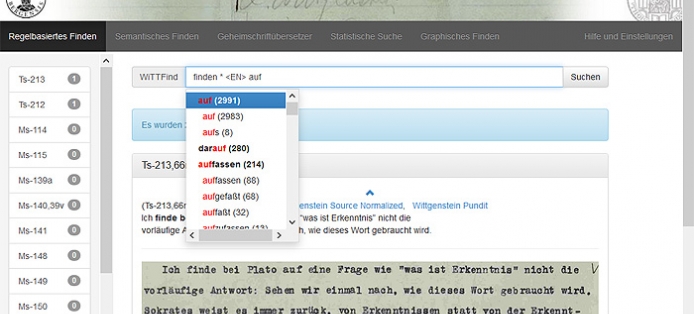
Since 2010 the Wittgenstein Archives at the University of Bergen (WAB) and the Center for Information and Language Processing at the University of Munich (CIS) cooperate in the research group “Wittgenstein in Co-Text”. The group developed the web-based FinderApp WiTTFind (see: http://wittfind.cis.uni-muenchen.de) and the “Wittgenstein Advanced Search Tools” (WAST). WiTTFind is a new kind of search machine, which uses rule-based technologies in combination with electronic lexica and various computational tools. It allows queries to WAB’s XML-TEI(P5) transcriptions of Ludwig Wittgenstein’s philosophical Nachlass, including queries based on word forms and syntactic, semantic and sentence structure specifications. The hits of our FinderApp are displayed as HTML outputs as well as highlighted in the facsimiles.
The Austrian-British philosopher Ludwig Wittgenstein (1889-1951) left at his death behind 20,000 pages of philosophical manuscripts and typescripts. This is called Wittgenstein's Nachlass. In the year 2000 the Wittgenstein Archives at the University Bergen (WAB) published the Nachlass in a CD-ROM edition, the so-called Bergen Electronic Edition (BEE). In 2009, WAB made 5000 pages from the Nachlass freely available on the web at Wittgenstein Source (http://www.wittgensteinsource.org). Though both the BEE and Wittgenstein Source are equipped with search tools, none of them includes lemmatized and grammatical search.
Since 2010 the Wittgenstein Archives at the University of Bergen (WAB, Prof. Alois Pichler) and the Center for Information and Language Processing at the University of Munich (CIS, Dr Maximilian Hadersbeck) cooperate in the research group “Wittgenstein in Co-Text”. The group developed the web-based FinderApp WiTTFind (see: http://wittfind.cis.uni-muenchen.de) and the “Wittgenstein Advanced Search Tools” (WAST).
WiTTFind is a new kind of search machine, which - unlike search capabilities of Google books and the Open Library project - uses rule-based technologies in combination with electronic lexica and various computational tools. It allows queries to WAB’s XML-TEI(P5) transcriptions of Ludwig Wittgenstein’s philosophical Nachlass, including queries based on word forms and syntactic, semantic and sentence structure specifications. Syntactic and semantic disambiguation is done with Part-of-Speech tagging and local grammars. To enable symmetrical autosuggestion during input of the query we implemented a first prototype of our special index structure (SIS, see: http://sis.cis.lmu.de). The hits of our FinderApp are displayed as HTML outputs as well as highlighted in the facsimiles.
With the help of docker technology our WEB-tool WiTTFind runs virtualized on popular operating systems like Linux, Windows and MACos. With the help of bootstrap technology it can be used within every bowser and also on modern devices: it runs on mobile devices, tablet computers and computers. Our tool is freely available to other humanity projects by defining APIs, a XML-TEI(P5) tagset, which defines the XML-structure of the texts processed from our FinderApp.
In the summer of 2014 our FinderApp won one of the three Open Humanities Award prizes, organized by the EU project DM2E "Digitized Manuscripts to Europeana" to honour groups that have produced technology in support of humanities research (see: http://dm2e.eu/open-humanities-awards-round-2-winners-announced/).
The presentation at of our project was referenced in the Austrian newspaper “Der Standard” under the title: „Wittgensteins Enkel im digitalen Wandel" (see: http://derstandard.at/2000012110707/Wittgensteins-Enkel-im-digitalen-Wan...) (2015).
Max Hadersbeck, Alois Pichler, Stefan Schweter, Florian Fink, Daniel Bruder